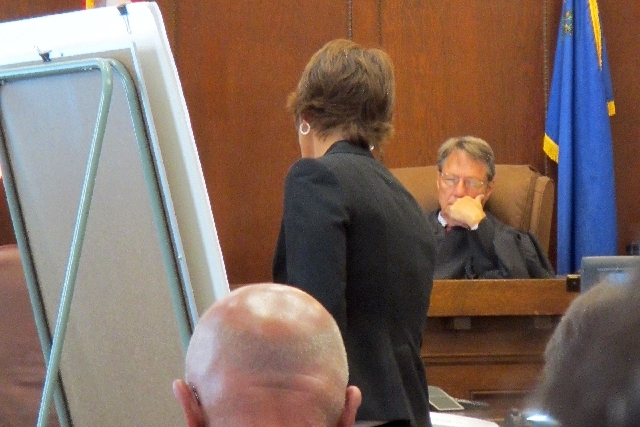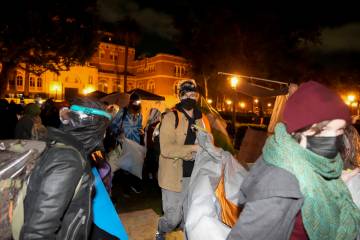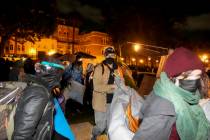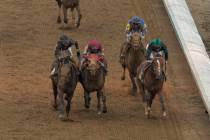Southern Nevada Water Authority’s pipeline plan draws fire during Ely hearing
ELY — A plan to funnel billions of gallons of rural groundwater to Las Vegas came under wide-ranging attack Thursday, as opponents laid out legal, scientific and even spiritual arguments against the Southern Nevada Water Authority’s pipeline.
Lawyers representing Great Basin ranchers, environmentalists, American Indian tribes and two counties in Utah spent the day trying to persuade a district judge to overturn a 2011 ruling by State Engineer Jason King granting water for the controversial project.
In turn, lawyers for the state and the authority defended King’s work, which cleared the wholesale water agency to pump up to 84,000 acre-feet of groundwater a year — enough for more than 160,000 homes — from four rural valleys in Lincoln and White Pine counties.
Authority attorney Paul Taggart said the pipeline project is “good” and the state engineer was “right” to award water to it. “This project is critical to Nevada, and to Southern Nevada specifically.”
Authority officials want to siphon groundwater from across eastern Nevada to supply future growth and provide a backup supply to the Las Vegas Valley, which gets 90 percent of its drinking water from an overtaxed and drought-stricken Colorado River.
They hope to deliver the water to the Las Vegas Valley through a network of pumps and pipelines stretching more than 300 miles and costing billions of dollars.
Simeon Herskovits, the lawyer for many of those who officially protested the pipeline, argued that the authority failed to present enough evidence to prove it can afford the project or that it can be built without destroying the environment and damaging existing water users.
To get around that, Herskovits said, King simply ordered the authority to conduct more studies later and come up with a monitoring and mitigation agreement to address any impacts that might occur.
“So you have a process and you have a promise, and that’s really all you have,” he said. “It’s not an actual safeguard against anything.”
Added Las Vegas attorney Paul Hejmanowski, who represents the Church of Jesus Christ of Latter-day Saints and its large cattle ranch in Spring Valley: “A declaration of good intentions is all it is. There is no proof that it can do anything to avert disaster.”
Senior District Judge Robert Estes will hear more arguments Friday before ruling on the appeal from pipeline opponents later this year.
If any of this is starting to sound familiar, that is because it happened once before.
In 2010, the state Supreme Court struck down two previous rulings that gave the authority almost 79,000 acre-feet a year from the same four valleys. Instead, the high court directed the state engineer to conduct new hearings on the authority’s groundwater applications, which he did in 2011.
That stunning reversal came after a district court appeal like the one now playing out in the White Pine County seat.
Much of Thursday’s testimony was technical, jargon-filled and, well, dry — lawyers arguing about water law. But there were a few surprises, including an unexpected apology from Taggart, the water authority attorney.
The unusual moment came after testimony from Paul Tsosie, a lawyer for the Ely and Duckwater Shoshone tribes who spent much of his time talking about the cultural and spiritual value of Spring Valley. He said such concerns seemed to be ignored, even ridiculed by the authority during the 2011 hearing before the state engineer.
That prompted Taggart to turn to the tribal members in the courtroom audience and apologize for what he called an “insensitive” question, posed during that hearing by another outside attorney for the water authority, comparing tribal beliefs to believing in the “boogeyman.”
Taggart said a remark like that never should have been made and he wished it hadn’t been.
Thursday’s hearing played out in a courthouse in use since 1908, three years after the land auction that gave Las Vegas its start. The standing-room-only crowd stayed for nearly all of the day-long testimony.
Snake Valley rancher and outspoken pipeline critic Dean Baker said there were more people who wanted to attend, but this is a busy time for agricultural operations in the area.
“We’re putting up hay. It’s a critical thing. Some people will be spending 20 hours straight on a baler,” Baker said.
Rancher Kena Gloeckner always has plenty of work to do, but she said she needed to come listen to at least one day of the hearing.
Her roots in Eagle Valley, east of Pioche, go back to the mid-1800s. She is afraid the authority’s pipeline plans for Dry Lake Valley in Lincoln County will destroy the winter range for her cattle and disrupt a family business that predates Nevada statehood.
“Our ranch to where it is now took five lifetimes,” said Gloeckner, whose maiden name is Lytle. “No one understands the investment of five generations. With the swoop of a pen, someone’s going to come in and wipe it all out.”




























